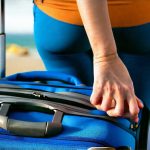Frequent urination is a common experience for many people, but it can become particularly noticeable – and even concerning – when traveling. Whether you’re embarking on a long road trip, taking to the skies, or exploring a new city, changes in your routine, environment, and even anxiety levels can all contribute to needing to visit the restroom more often. It’s understandable to wonder if this is simply a normal consequence of travel or an indication of something more serious. The truth is that frequent peeing during travel often falls into the category of normal, but understanding why it happens and when you should seek further evaluation is crucial for peace of mind and a comfortable journey. This article will delve into the factors causing increased urination while traveling, how to manage it effectively, and when professional medical advice might be necessary.
Travel inherently disrupts our established routines – from what we eat and drink to how much we move and even the air pressure around us. These disruptions can significantly impact bladder function and frequency. Moreover, travel often introduces stress; anticipatory anxiety about flights, unfamiliar environments, or tight schedules all contribute to physiological changes that can affect the urinary system. It’s not uncommon for people to feel a heightened awareness of bodily functions when they are outside their comfort zone, making even normal urges seem more pronounced. Understanding this interplay between physical and psychological factors is key to navigating frequent urination while traveling without unnecessary worry.
Physiological Factors at Play
The human body is remarkably adaptable, but it doesn’t always adjust instantaneously to changes in environment or routine. Travel introduces a multitude of these shifts, many of which directly impact bladder function. One significant factor is fluid intake. We often consume more fluids when traveling – whether it’s staying hydrated on long flights (often with diuretics like coffee and tea), enjoying new beverages in unfamiliar places, or simply being exposed to warmer climates that increase thirst. This increased fluid intake naturally leads to increased urine production.
Beyond fluid consumption, altitude changes can also play a role, especially during air travel. Higher altitudes cause the body to excrete more fluids as it adjusts to lower oxygen levels. Similarly, prolonged sitting – common on planes, trains, and in cars – can reduce blood flow to the bladder and kidneys, potentially increasing urination frequency. Even subtle shifts in atmospheric pressure can affect the body’s fluid balance. These aren’t necessarily signs of a problem; they are normal physiological responses to the unique demands of travel.
Finally, consider the effect of caffeine and alcohol. Travelers often indulge in these more freely while away from home, both known diuretics that increase urine production. The combination of all these factors – increased fluid intake, altitude changes, prolonged sitting, and diuretic consumption – can create a perfect storm for frequent urination during travel. It’s important to remember that this is usually temporary and resolves once you return to your normal routine. If you are concerned about kidney issues https://urologyinform.com/is-frequent-peeing-a-sign-of-kidney-issues/, it’s best to seek professional advice.
Behavioral & Psychological Influences
While physiological factors are significant, behavioral and psychological influences often amplify the sensation of needing to pee frequently while traveling. Anxiety is a major contributor. The stress associated with travel – from navigating airports to worrying about delays or lost luggage – can trigger the body’s “fight-or-flight” response. This leads to increased adrenaline production, which in turn affects bladder control and increases urinary frequency. It’s not uncommon for travelers to feel a heightened awareness of their bodily functions when they are stressed, making even normal urges seem more urgent or frequent.
Another behavioral factor is the “just in case” phenomenon. When away from familiar restroom facilities, many people adopt a strategy of emptying their bladder more frequently than necessary – “just in case” there isn’t an opportunity later. This creates a self-fulfilling prophecy, reinforcing the habit of frequent urination and potentially leading to a vicious cycle. The unfamiliarity of new environments also contributes; travelers may be more aware of restroom locations and feel compelled to use them proactively, even if they don’t genuinely need to.
Finally, changes in routine disrupt the body’s natural rhythms. When your schedule is disrupted – different sleep patterns, altered meal times, and varying levels of activity – your bladder can become less predictable. It takes time for the body to adjust, and during this period, increased urinary frequency is common. Recognizing these psychological and behavioral factors can help you manage anxiety and break the cycle of frequent urination. For women experiencing changes, understanding urethral pain https://urologyinform.com/is-urethral-pain-common-during-menopause-in-women/ can be helpful.
Managing Frequent Peeing During Travel
Effectively managing frequent peeing during travel involves a combination of proactive strategies and mindful adjustments to your routine. Firstly, hydration management is crucial. Don’t drastically reduce fluid intake – dehydration can lead to other health problems. Instead, aim for consistent hydration throughout the journey, avoiding excessive amounts at once. Spread your fluid intake evenly and be mindful of diuretic beverages like coffee, tea, and alcohol. Consider opting for water or herbal teas instead.
Secondly, plan restroom breaks strategically. Rather than waiting until you feel an urgent need, schedule regular bathroom stops – particularly during long journeys. This can help reduce anxiety and prevent the “just in case” emptying cycle. Use apps that locate restrooms along your route or at airports to alleviate concerns about accessibility. Thirdly, practice relaxation techniques to manage travel-related stress. Deep breathing exercises, meditation, or listening to calming music can all help reduce anxiety levels and improve bladder control.
Here are some additional tips:
1. Avoid consuming large amounts of fluid right before takeoff or during long stretches of travel.
2. Wear comfortable clothing that doesn’t restrict blood flow.
3. Get up and move around periodically to promote circulation.
4. Empty your bladder completely before leaving for the airport or starting a road trip.
When To Seek Medical Advice?
While frequent urination during travel is often normal, there are instances where it warrants medical attention. Persistent frequency that continues even after returning home should be evaluated by a healthcare professional. Similarly, if you experience other symptoms alongside increased urination – such as pain or burning sensations while urinating, blood in your urine, fever, back pain, or difficulty emptying your bladder – seek immediate medical care. These could indicate an underlying urinary tract infection (UTI), kidney problem, or another medical condition.
It’s also important to consider any pre-existing health conditions. Individuals with diabetes, overactive bladder, or prostate issues may experience more pronounced urinary symptoms during travel and should consult their doctor before embarking on a trip. If you have concerns about your ability to manage frequent urination, discuss them with your healthcare provider before traveling. They can offer personalized advice and potentially prescribe medication to help alleviate symptoms.
Finally, trust your instincts. If something feels genuinely wrong or if your urinary frequency is significantly different from your baseline, don’t hesitate to seek medical attention. It’s always better to err on the side of caution when it comes to your health. Remember that this article provides general information and should not be considered a substitute for professional medical advice. Many women wonder is frequent peeing https://urologyinform.com/is-frequent-peeing-always-a-problem-for-women/ a normal occurrence?
Distinguishing Normal Travel Urination From Underlying Issues
The key to distinguishing between normal travel-related frequent urination and an underlying medical issue lies in context and duration. As discussed, temporary increases in urinary frequency during travel are often attributable to factors like fluid intake, altitude changes, anxiety, and routine disruptions. However, if the increased frequency persists for several days or weeks after returning home, it’s a sign that something more may be going on. Pay attention to accompanying symptoms: pain, burning, blood in urine, fever, or difficulty urinating are all red flags.
Consider your baseline urinary habits before travel. If you typically have no issues with bladder control and rarely need to pee during the night, a sudden change in frequency is more concerning than if you already experience occasional urgency or nocturia. A detailed history of your symptoms can help your doctor determine the cause of the problem. It’s helpful to keep a “voiding diary” – recording when you urinate, how much urine you produce, and any associated symptoms – for a few days before your appointment.
Finally, remember that certain medical conditions can predispose you to urinary problems. Individuals with diabetes, prostate enlargement (in men), or overactive bladder syndrome may experience more frequent urination even without travel as a factor. If you have any of these underlying health issues, discuss your concerns with your doctor and follow their recommendations for managing your condition while traveling. For those concerned about changes after age 50, is frequent urination https://urologyinform.com/is-frequent-urination-after-50-normal/ a common concern?





















